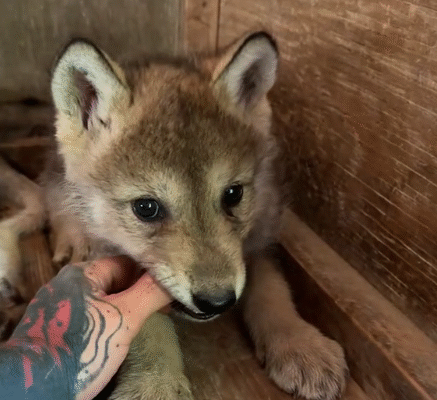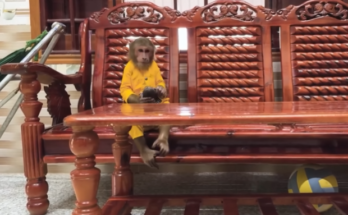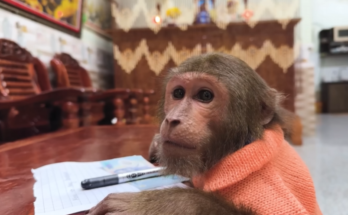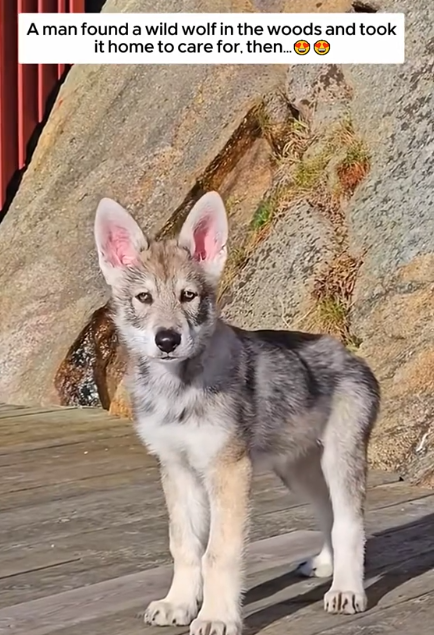
Deep in the northern wilderness, where the pines whisper secrets to the wind and snow blankets the forest floor like a thick, white quilt, a man named Thomas lived a quiet and solitary life. He had moved to the woods five years earlier after retiring early from his job as a wildlife photographer. With a small cabin, a roaring fireplace, and the serene presence of nature, he thought he had seen it all—until one frosty morning changed everything.
Thomas was out for his usual walk, camera slung over his shoulder, hoping to capture some early winter scenes. The forest was silent except for the crunch of snow under his boots and the occasional call of a raven. As he made his way down a narrow trail near a frozen creek, he noticed something unusual in the distance—a lump of fur sprawled out in the snow.
Curious and cautious, Thomas approached slowly. As he got closer, his eyes widened. It was a young wolf, perhaps a year old, lying motionless, its breathing shallow, and its fur matted with ice and dried blood. A leg was twisted awkwardly, likely broken, and the wolf’s eyes, golden and wild, blinked up at him with a mix of fear and pain.
Instinct told him to leave it be. Wild animals are unpredictable, especially when hurt. But the other part of him, the compassionate part that had spent decades photographing and understanding animals, couldn’t just walk away. He set his camera down and knelt carefully beside the creature.
“I’m not here to hurt you,” Thomas whispered, his voice low and calm. He took off his coat and gently wrapped it around the wolf. The animal didn’t resist, just shivered and groaned softly.
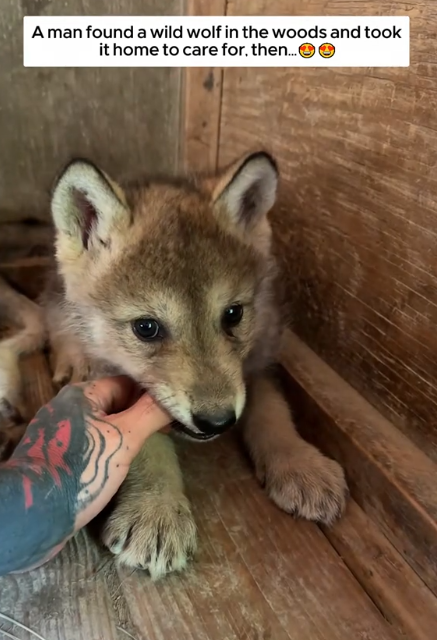
It took a great deal of effort to carry the wolf back to the cabin. It was heavy, and Thomas had to stop several times to catch his breath. But eventually, they made it. He laid the wolf on a pile of blankets near the fireplace and began tending to its injuries. He cleaned the wounds, carefully splinted the broken leg, and gave it water through a syringe.
The first night was tense. Thomas didn’t sleep much. He knew wolves were wild, instinctual, and potentially dangerous. But the young wolf, weakened and in pain, made no attempt to attack. It just lay there, occasionally whining or shifting slightly in its sleep.
Over the next few days, Thomas worked tirelessly. He boiled chicken and venison for the wolf, which began eating in small amounts. Slowly, it regained some strength. Though it never let Thomas touch it freely, it also never snarled or bit. There was a silent understanding growing between them—a cautious truce born from necessity and trust.
Thomas named the wolf Shadow, inspired by its ability to blend into the snowy forest and its quiet, watchful nature. As weeks passed, Shadow’s leg began to heal. Thomas often spoke to him, telling stories of his photography days or reading aloud in the evenings. At first, Shadow simply listened, but eventually, he would raise his head, ears flicking at certain sounds, and his eyes began to soften.
Winter melted into spring, and the forest bloomed with life again. Thomas had grown attached to Shadow, and the wolf, once wild and broken, now followed him around the cabin yard, limping slightly but growing stronger every day. They would sit together under the stars, Thomas sipping tea and Shadow lying close by, eyes scanning the dark trees.
But Thomas knew something important. Shadow wasn’t a dog. He wasn’t a pet. He was a creature of the wild, born to roam and howl under the moonlight. As much as Thomas wanted to keep him forever, he knew he couldn’t cage what was meant to be free.
One morning, as they walked by the creek where they had first met, Thomas paused. Shadow stopped too, looking up at the man who had become his unlikely friend. Thomas knelt and scratched gently behind his ears, something Shadow had come to tolerate and even enjoy.
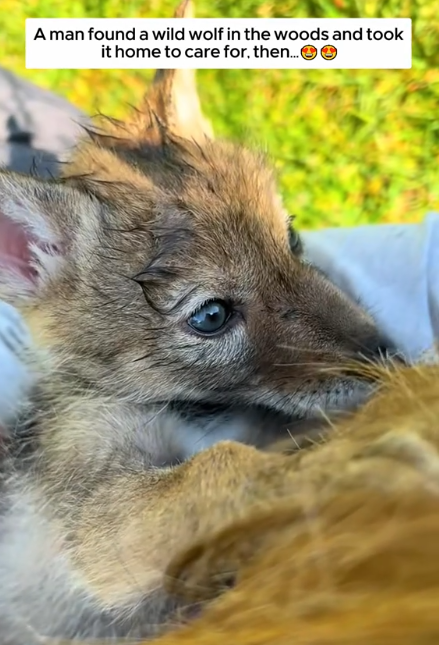
“You’re almost ready to go, aren’t you?” Thomas said softly.
Shadow tilted his head, his golden eyes filled with something that almost looked like understanding. It was time.
Over the next few days, Thomas prepared Shadow for release. He reduced the hand-fed meals, encouraged Shadow to hunt small prey around the area, and opened the cabin gate wider each morning. Shadow would leave for a few hours, always returning by sunset.
Then, one bright morning, Shadow didn’t return.
Thomas waited, his heart heavy and uncertain. Hours passed. Then a day. Then two. Part of him feared the worst—that Shadow had been hurt again, or perhaps hunted by others. But deep down, he knew the truth. Shadow had gone home. The call of the wild had finally taken him back.
Weeks went by, and Thomas missed his companion terribly. He still walked the trails, always hoping to catch a glimpse of that familiar gray fur. But Shadow remained hidden—if he was even still nearby.
Then one morning, Thomas heard a howl in the distance. It was long, strong, and unmistakably wolf. He stepped out of the cabin and looked toward the treeline. And there, just on the edge of the woods, stood Shadow. Beside him were two other wolves—larger, likely packmates. Shadow looked directly at Thomas, held his gaze for a moment, and then vanished into the forest.
Thomas smiled, a tear slipping down his cheek. Shadow was where he belonged.
Though they never met face to face again, the howls continued. Sometimes at night, sometimes in the early dawn. And Thomas would always answer—not with howls, but with stories, sitting by the fire, talking into the forest as though his friend could still hear.
Because in a way, he could.
And so, the man who once found a wild wolf in the woods gave it a second chance at life—not by keeping it, but by healing it, loving it, and setting it free.
